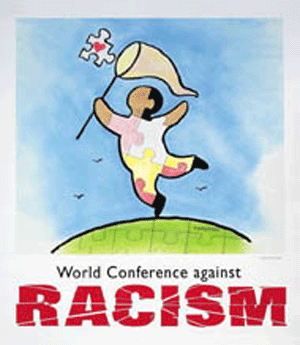
World Conference against Racism, Racial Discrimination,
Stories, free and personal, can combat racism
Xenophobia and Related Intolerance
31 August 2001
by Stephen Webb
Speakers at a roundtable discussion on information, communication and the media at the NGO (non-governmental organizations) Forum at the World Conference Against Racism (WCAR) in Durban, South Africa, on August 28 discussed the role of media in dealing with issues of race and discrimination.
The draft declaration prepared prior to the Forum noted that modern information technology was being used to perpetuate a climate of intolerance and that mainstream media often rendered peoples invisible or used negative racial stereotypes to report on them.
Dr Linda Fuller from the Communications Department, Worcester State College, USA, said people need to tell their stories, whether oral or visual. Communicators need to teach people to tell their stories.
"If we do not, we need to be worried about the big corporates who tell our stories - but they are not really our stories - so someone can sell products," she said.
A proponent of media freedom at the discussion said that the NGO and government documents prepared for their respective WCAR meetings in Durban showed a negative attitude towards the media. They were characterized by mistrust, expected the worst, and exaggerated the amount of media devoted to hate speech, he said.
The documents ignored the fact that, in struggles against racism, various forms or discrimination were reported in the press, he added.
Statements in the WARC documents want to dictate and assign roles to journalists, he said, and that could have a negative effect for two reasons. Firstly, journalists could react resentfully and counterproductively. And, secondly, WARC recommendations challenge media freedom.
"Actual journalists all want the right to report situations as they see them. Give them that right and they will report pretty much as you would hope. But not if you dictate to them."
The Rev. Bob Scott, from the World Council of Churches (WCC) Cluster of Communication later said that there has been an increase in pressure on organizations like the WCC over the last decade to give space to people's stories rather than just to provide analyses of their situations.
"We have the stories, but we don't know how to use them so as to bring about change. We hear the stories, but they become additional rather than central to the way change occurs," Scott said.
On press freedom, Scott wondered what freedom of the press means in an age of incredible expansion of Internet technology. People are surrounded with so many different points of view it iss difficult to know where freedom lies.
"As someone who tries to write fair and just stories, I know there are so many sources of different points of view that it's hard to know where truth lies."
Referring to an increasing burden on journalists to pick their way through available information to find out what the truth was, Scott suggested that they must depend on their instincts. Allowing journalists to exercise their judgment is the best approach, Scott concluded.